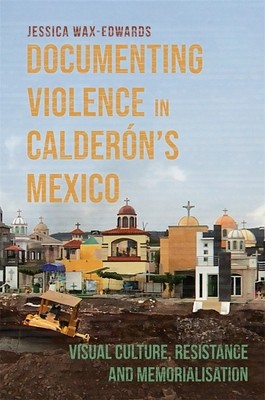
- We will send in 10–14 business days.
- Author: Jessica Wax-Edwards
- Publisher: Tamesis Books
- ISBN-10: 1855663643
- ISBN-13: 9781855663640
- Format: 15.6 x 23.4 x 1.3 cm, kieti viršeliai
- Language: English
- SAVE -10% with code: EXTRA
Reviews
Description
In Mexico, during the presidency of Felipe Calderón (2006-2012) and as a direct result of his 'war' on drugs, at least 60,000 people were killed, tens of thousands were 'disappeared' and countless more were subjected to kidnapping and sexual violence. This book analyses how artists and filmmakers, alongside affected citizens, attempted to navigate, articulate and contend with this unparalleled escalation in brutality.
In Mexico, during the presidency of Felipe Calderón (2006-2012) and as a direct result of his 'war' on drugs, at least 60,000 people were killed, tens of thousands were 'disappeared' and countless more were subjected to kidnapping and sexual violence. This book analyses how artists and filmmakers, alongside affected citizens, attempted to navigate, articulate and contend with this unparalleled escalation in brutality. The texts studied here provide a critical visual archive of this first phase in the drug war and show how artists including Pedro Pardo, Fernando Brito, Mónica González and Natalia Almada attempted to challenge official narratives, foster emerging nodes of resistance and seek justice for citizens. Bringing together works of photography, photojournalism, documentary and short fiction cinema, the book argues for the vital role of cultural production in documenting institutional corruption, human rights abuses and narco-related violence in Mexican society and providing a space to grieve and remember the victims. As Mexico's socio-political landscape continues to deteriorate, the book shows how its visual cultural legacy provides a means of understanding and responding to the violence.EXTRA 10 % discount with code: EXTRA
The promotion ends in 23d.10:44:18
The discount code is valid when purchasing from 10 €. Discounts do not stack.
- Author: Jessica Wax-Edwards
- Publisher: Tamesis Books
- ISBN-10: 1855663643
- ISBN-13: 9781855663640
- Format: 15.6 x 23.4 x 1.3 cm, kieti viršeliai
- Language: English English
In Mexico, during the presidency of Felipe Calderón (2006-2012) and as a direct result of his 'war' on drugs, at least 60,000 people were killed, tens of thousands were 'disappeared' and countless more were subjected to kidnapping and sexual violence. This book analyses how artists and filmmakers, alongside affected citizens, attempted to navigate, articulate and contend with this unparalleled escalation in brutality.
In Mexico, during the presidency of Felipe Calderón (2006-2012) and as a direct result of his 'war' on drugs, at least 60,000 people were killed, tens of thousands were 'disappeared' and countless more were subjected to kidnapping and sexual violence. This book analyses how artists and filmmakers, alongside affected citizens, attempted to navigate, articulate and contend with this unparalleled escalation in brutality. The texts studied here provide a critical visual archive of this first phase in the drug war and show how artists including Pedro Pardo, Fernando Brito, Mónica González and Natalia Almada attempted to challenge official narratives, foster emerging nodes of resistance and seek justice for citizens. Bringing together works of photography, photojournalism, documentary and short fiction cinema, the book argues for the vital role of cultural production in documenting institutional corruption, human rights abuses and narco-related violence in Mexican society and providing a space to grieve and remember the victims. As Mexico's socio-political landscape continues to deteriorate, the book shows how its visual cultural legacy provides a means of understanding and responding to the violence.

Reviews